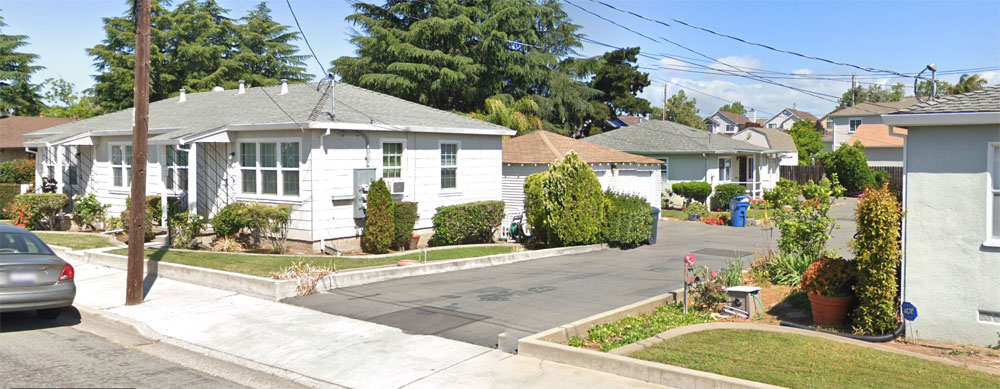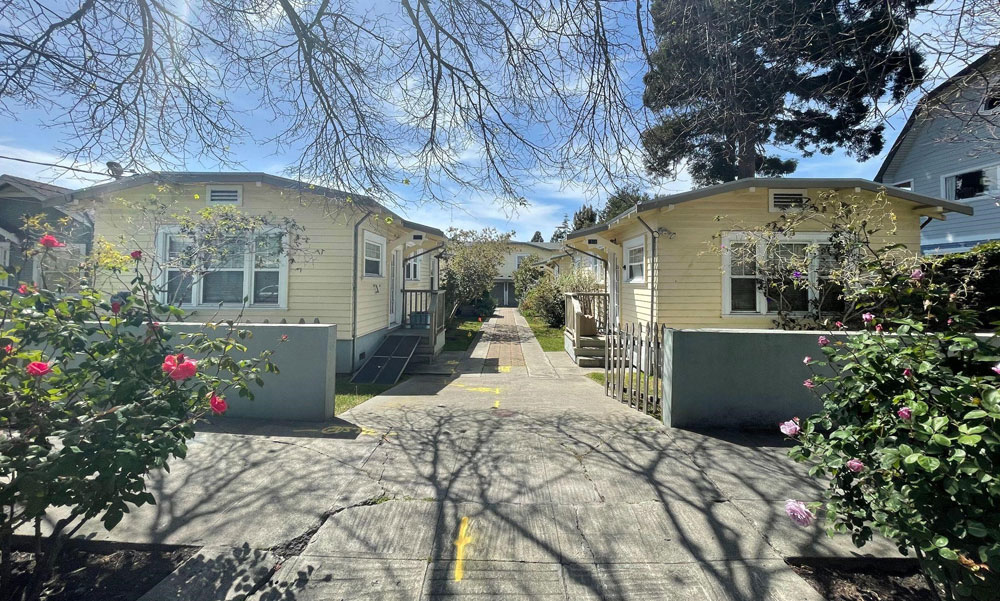Community Development
Contact Info
200 “H” Street
Antioch, CA 94531
Building Services Division
Tel: (925)779-7065
Planning Division
Tel: (925) 779-6159
Code Enforcement Division
Tel (925) 779-7042
Planning Division
Housing and the Faith Community
In partnership with Hope Solutions and Multi-Faith ACTION Coalition (MFAC), the City is changing its regulations to allow sites currently used as houses of worship (e.g., churches, temples) to also be used for affordable housing. This endeavor is one affordable housing production strategy that the team is advancing pursuant to a Breakthrough Grant.
UPDATE!
Starting December 28, 2023, faith-based organizations (FBOs) located in the Innovative Housing Overlay may add “cottage communities” of affordable housing on their land! A map of the Innovative Housing Overlay sites can be found here. The application for a cottage community can be found here.
With these new regulations, 33 faith institution parcels totaling 90 acres of land have been unlocked for affordable housing development. These faith institutions with excess land or large parking lots can now redevelop their properties with housing while retaining their house of worship on the same site. Prior to these zoning reforms, most FBOs could not develop housing on their properties based on their zoning district and/or designation in the General Plan. The City’s changes do not force houses of worship to add housing; they allow interested FBOs to add housing if they want.
See more information below.
The idea of leveraging faith-owned land for affordable housing has gained momentum in California in recent years partly due to research from the Terner Center showcasing the faith-owned land potential statewide and recently passed Senate Bill [SB] 4 (the Affordable Housing on Faith Lands Act). SB 4 was signed by Governor Newsom in October 2023 and it allows and streamlines affordable housing development on land owned by faith institutions and nonprofit colleges. SB 4 is geared towards large apartment buildings financed by Low Income Housing Tax Credits, which is a different model than Antioch has pursued.
In Antioch, many faith- and community-based organizations have pointed to communities of small-footprint homes (also called tiny home villages, pocket neighborhoods, or cottage courts) as a promising type of home to develop on faith-owned land. Smaller footprint homes, which are sometimes built in a factory, can be built more quickly and cost effectively than conventional site-built homes or apartments, and their smaller scale allows them to gently fill in existing neighborhoods.
These cottage communities would not be emergency shelter pallet homes or sanctioned encampments. Examples of smaller homes, bungalows, and cottage courts are prevalent in many California cities, including Antioch, but today’s zoning regulations make these types of homes difficult to build and even illegal in many cases. As part of the effort to allow housing on faith-owned land, the City has added a new residential typology: cottage communities, described further below.

A “pocket neighborhood” in Antioch

A cottage court in Alameda County
Cottage communities will have to be consistent with objective development standards, as codified in Section 9-5.3850 Innovative Housing Overlay District of the Antioch Zoning Code. An overview of key standards is included below.
| Development Standard | Regulation |
| Site Qualification | Sites shown with the IH Overlay District on the Zoning Map are qualified for by-right development of cottage communities and applicants may submit an application to the Planning Division for ministerial review. For sites outside of the IH Overlay District, a rezone to the IH Overlay District is required through City Council approval. |
| Uses | Cottage communities of multiple Accessory Dwelling Units (ADUs) Accessory uses such as resident amenity areas or supportive services for permanent supportive housing would also be allowed |
| Existing Uses Preserved | Underlying/base zoning for overlay sites still applies Religious institutions may remain on site |
| Affordability | 100% affordable housing (for households at or below 80% of AMI), except that:
|
| Density Range | At least three cottages are required to be considered a cottage community. By Right: up to 15 dwelling units per acre (based on site development area and not entire parcel acreage and with one ADU counting as one unit)Conditional Use Permit required for anything greater than 15 units/acre |
| Height | No more than two (2) stories (up to 18 ft), except that up to 25 ft allowed when the roof is pitched with at least a slope of 6 to 12 and all parts of the roof above 18 feet are pitched. |
| Building Footprint | Single cottages: Maximum 1,200 sq ft Duplex cottages: Maximum 2,400 sq ft |
| Open Space | Common open space required at a sliding scale ranging from 100-250 sq ft per unit as specified in §9-5.3850(F)(4), with certain exceptions.
Developments greater than 10 units would provide at least one community amenity from a menu of six options (e.g., community garden, barbeque area). |
| Orientation | At least 50% of cottages abut open space. Communities with at least 15% of units affordable to extremely- or very low-income households may decrease this requirement to 40% of units. |
| Off-Street Parking | One space per unit Consistent with AB 1851, spaces may be shared between the religious institution and the residences for eligible projects, as codified in § 9-5.1704 “Parking Reductions.” |
| Setbacks | The following setbacks would apply when the development site is adjacent to a property line.
Setback requirements would not apply when development projects are internal to the parcel. |
| Architectural Standards | A cohesive architectural theme would be required across all cottages. |
| Other Site Design Standards | Requirements for pedestrian connectivity, building separation, and waste and recycling also apply. |
The Breakthrough Grant Team conducted a listening campaign to determine whether cottage communities on faith-owned land would in fact be a viable and desirable housing solution in Antioch. The listening campaign primarily sought to hear from unhoused residents to learn whether they would choose to live in small footprint homes and how they would feel about living on faith-owned land. The Breakthrough Grant Team also spoke with faith leaders, members of faith institutions, and community-based organizations. We reached over 400 people with this listening campaign, the vast majority of whom made 30% or less than the Area Median Income (i.e., “extremely low-income households” under State law). You can read about more about the listening campaign and the feedback received here.
Community feedback from the listening campaign has been directly incorporated in the development standards for cottage communities. Examples of this include:
- Requiring that projects be below-market-rate, affordable housing and prioritizing deeply affordable homes (i.e., providing more flexibility for projects with deeper affordability).
- Prioritizing the number of homes over other amenities while ensuring shared open spaces are used for building a sense of community (i.e., providing a smaller amount of required open space yet requiring amenities that will create touchpoints with neighbors, most of which were crowd-sourced from listening session attendees).
- Clarifying that homes will not be tied to religious practice (i.e., requiring compliance with applicable Fair Housing laws).
- Removing barriers to development unique to faith institutions (i.e., allowing affordability covenants to be driven by development teams and their funding sources, allowing a small number of units to be reserved for staff of the religious institution, and allowing shared facilities with the faith institution for trash, parking, and recreation).
- Reducing governmental constraints to housing development (i.e., defining cottages as Accessory Dwelling Units to ensure proportionality in impact fees and timely processing).
- Allowing “tiny homes” under 400 sq to allow greater options and a greater chance of more affordable units.
This work is made possible through a Breakthrough Grant provided by the Partnership for the Bay’s Future (PBF). PBF is a collaborative effort using racial and economic equity as its guiding influence to advance housing solutions that produce and preserve affordable homes so that the Bay Area remains a diverse place where all people are welcome and can thrive.
The City of Antioch, in collaboration with Hope Solutions and Multi-Faith ACTION Coalition, was one of eleven teams awarded a grant.
Program Partner Websites
- Terner Center Research: Mapping the Potential and Identifying the Barriers to Faith-Based Housing Development
- Updated Terner Center Research: The Housing Potential for Land Owned by Faith-Based Organizations and Colleges
- More information on the Breakthrough Grant efforts
- KQED article: California Churches Want to Build Affordable Housing on Their Land, So Why Is It So Hard?
- City Council presentation on the Breakthrough Grant
- 10/18/2023 Planning Commission staff report
- 11/14/2023 City Council staff report (Agenda Item #5)
- NBC Bay Area: Move to create more affordable housing in Contra Costa County
- City of Antioch: Development Application for Cottage Communities
- Breakthrough Grant Year 1 Listening Campaign Report
Examples from other cities
- City of Pasadena’s Religious Facility Housing
- City of San Jose’s Affordable Housing on Sites with Assembly Uses
Select Example Projects
Housing development on faith-owned land and villages of cottages can range in size, ownership/rental structure, populations housed, and affordability. The list below gives a glimpse into what other projects have looked like.
- St Paul’s Commons, Walnut Creek
- Stuart Street Co-Op, Berkeley
- St John’s Square, Sacramento
- Peace Village, Eugene, OR
- Veterans Village, Santa Rosa
- Cottages on Vaughan, Clarkston, GA
Staff Contact
Zoe Merideth, Planning Manager zmerideth@antiochca.gov

